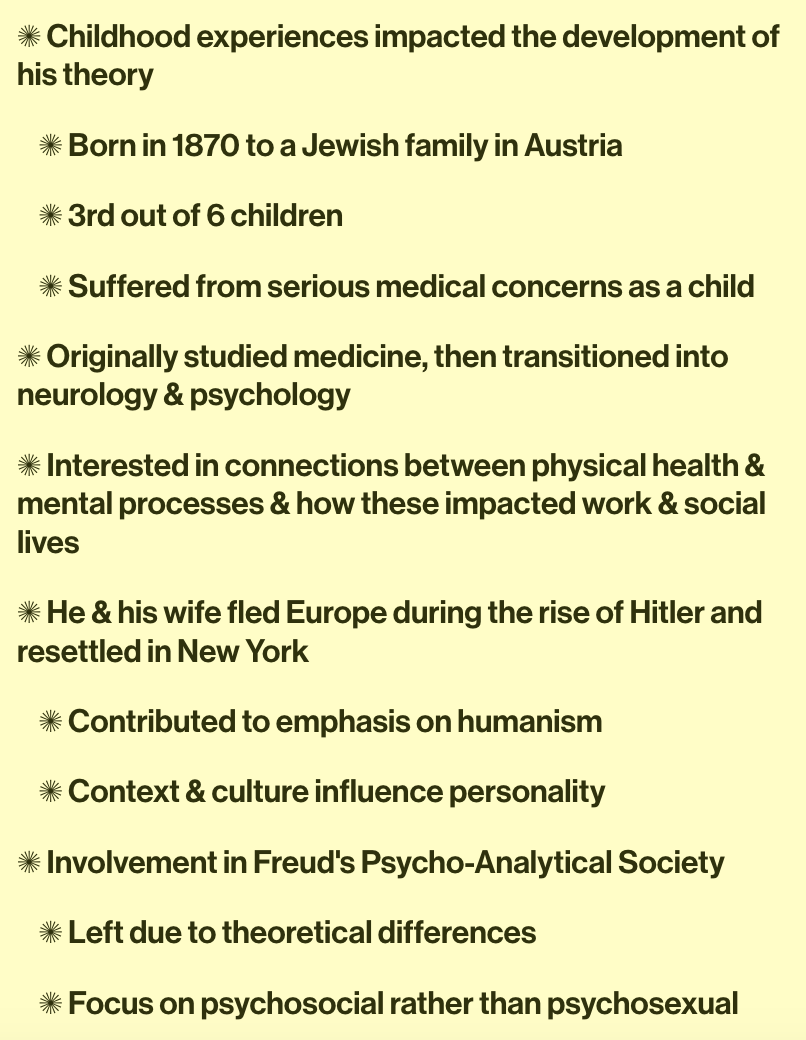✺ Adlerian Therapy ✺
Individual Psychology
~
Individual Psychology ~
Founder
"Adler cared deeply about the common person & desired to take his ideas & apply them to improving peoples' day-to-day lives.
He wrote & spoke in non-technical ways that were easy to understand. He spoke out about issues such as child-rearing practices, prejudice, & school reforms.
He advocated for children who were at risk, women's rights, & the importance of community mental health"
Alfred Adler
Early childhood health issues, along with sibling rivalries contributed to his emphasis on birth order, inferiority & superiority, & parental overprotectiveness
Basic Principles
Individual Psychology:
Theory of development that emphasizes unique beliefs & skills that people develop from early childhood & that serve as a reference for their attitudes, behaviors, & private view of self, others, & society.
One of the most comprehensive theories as it highlights the way biological & psychological factors interact with environmental & social influences to explain human behavior & help people change.
✺ Mental health issues are a result of normal developmental difficulties
✺ Holistic & social view of humanity
✺ Highlights the unity & uniqueness of each individual in relation to their social context
✺ Phenomenological - focuses on a person’s inner reality & the way that person perceives the world
✺ Behavior is purposeful & people can channel their behavior in ways that promote growth
✺ Strengths-based & empowering
✺ People have the inherent capability to reach their potential & are on a path of forward motion
✺ Humans strive to be their best selves using the resources available to them
Key Concepts
✺ Social interest is the most important value
✺ Social interest & positive involvement in the community are hallmarks of a healthy personality
SOCIAL INTEREST
INFERIORITY
VS
✺ Feeling of inadequacy & incompetency that develops in infancy & promotes striving for superiority
✺ Inferiority Complex: strong belief that you are not good enough
SUPERIORITY
✺ Drive that allows individuals to become skilled, competent, & creative
✺ Superiority Complex: Mask feelings of inferiority by being arrogant
Feelings of inferiority during the early childhood years have a great impact on development
How children deal with their feelings of inferiority impacts their personality & way of being in the world
-
✺ getting along with oneself & knowing who you are
✺ added by Mosak & Dreikurs
-
✺ searching for existential meaning
✺ added by Mosak & Dreikurs
-
✺ sense of belonging & contribution
-
✺ forming & maintaining intimate romantic relationships
-
✺ meaningful & productive activities that provide a sense of purpose
BASIC MISTAKES:
✺ self-defeating aspects of individuals' lifestyles that may affect their later behavior
1. Overgeneralizations - "Everyone hates me"
2. False or Impossible Goals - "I must be the best to be loved"
3. Misperceptions of Life & Life's Demands - "Life's too hard for me"
4. Denial of One's Basic Worth - "I'm stupid and unloveable"
5. Faulty Values - "I must be the best before someone beats me to it"
Most Common Basic Mistakes
Lifestyle Patterns
The unique way in which each individual seeks to find a place in the world, to overcome feelings of inferiority, & to achieve goals.
Lifestyle Encompasses
✺ A person's subjective worldview, including beliefs about the self & others, values, inner narratives, expectations, & attitudes
✺ Behavioral strategies that a person uses to achieve goals & negotiate the life journey
✺ Outcome or consequences of those behaviors
✺ A person’s goals
4 Typical Lifestyle Patterns
developed in early childhood
Goals of Counseling
Role of Counselor
✺ Cooperative & Collaborative
✺ Supportive & Empathetic
✺ Equality & Mutual Respect
✺ Work to harness client resources & help clients access these resources
✺ To increase people’s feelings of belongingness & promote social interest & community feeling
✺ Increase awareness that people’s pain is a result of faulty logic
✺ Gain insight into & modify basic mistakes; reduce feelings of inferiority & build self-confidence
✺ Educational, physical, & cognitive development
✺ Identify positive traits, characteristics, & inherent drives of every individual & enhance them to overcome any undesireable drives or motivations
Therapeutic Process
Phase 1: Engagement
ESTABLISHING A RELATIONSHIP
✺ Hearing The Story
✺ Collaborative
✺ Encouragement & showing care
✺ Focus on…
Strengths, intrinsic motivation, the present, effort over outcome, what is being learned
Phase 3: Insight
ENCOURAGE INSIGHT & SELF- UNDERSTANDING
✺ Involves challenging & confrontation
✺ Involves interpretation
✺ Present in gentle ways
✺ State as hunches or guesses
✺ Focus on…
the present, consequences over unconscious motivation
Phase 2: Assessment
DEEPENING UNDERSTANDING OF CLIENT’S BACKGROUND, MENTAL HEALTH, PERSONALITY, & LIFESTYLE
✺ Involves a variety of techniques
Phase 4: Reorientation
CHANGE PHASE - PUT INSIGHTS INTO PRACTICE
1. Clarification of goals
2. Development of healthy thinking
3. New learning is applied
4. Barriers to progress are addressed & work to be removed
Therapeutic Techniques
Push-Button
✺ lifestyle assessment, family constellation, early recollections analysis
✺ the question, acting as if, reflecting as if
✺ catching oneself, spitting in the soup, paradoxical strategy
Application of Adlerian Therapy
Multicultural Groups
✺ Suitable for a wide range of diverse populations due to focus on how context & culture impact an individual
✺ Focus on community & social interest makes it applicable to collectivist perspectives
✺ Religion & spirituality are addressed through life tasks & are seen as important
✺ Actively addresses & acknowledges discrimination & disenfranchisement
✺ Can be particularly helpful for individuals with disabilities due to the higher likelihood of feelings of inferiority & discrimination
LIMITATIONS
✺ Critics feel there is an overemphasis on social factors & not enough focus on biological & genetic factors that impact individual differences
✺ Some believe that Adlerian Therapy has an overly simplistic view of motivation
✺ Adlerian Therapy may not address all aspects of the human experience & is less comprehensive than some other theories



